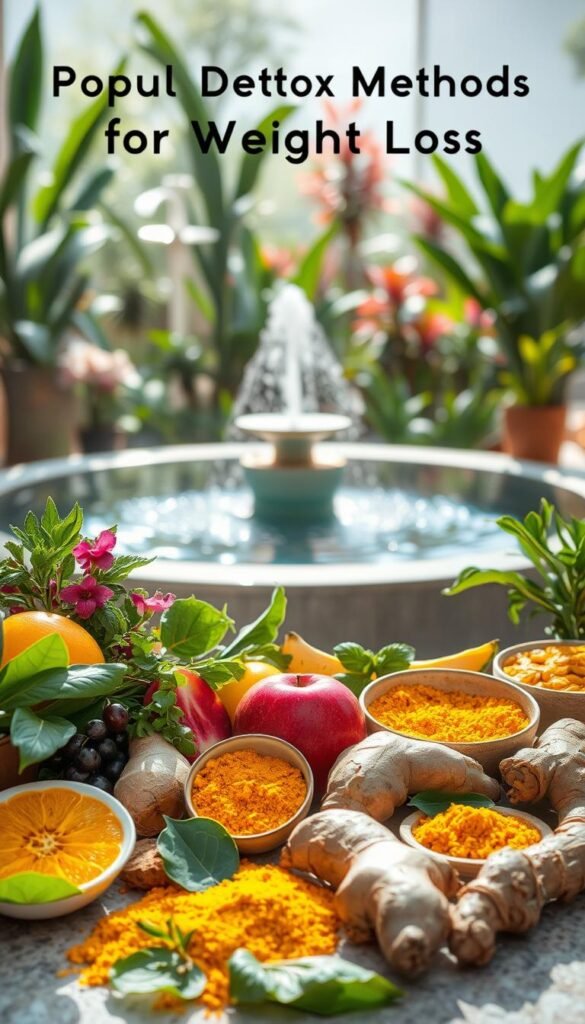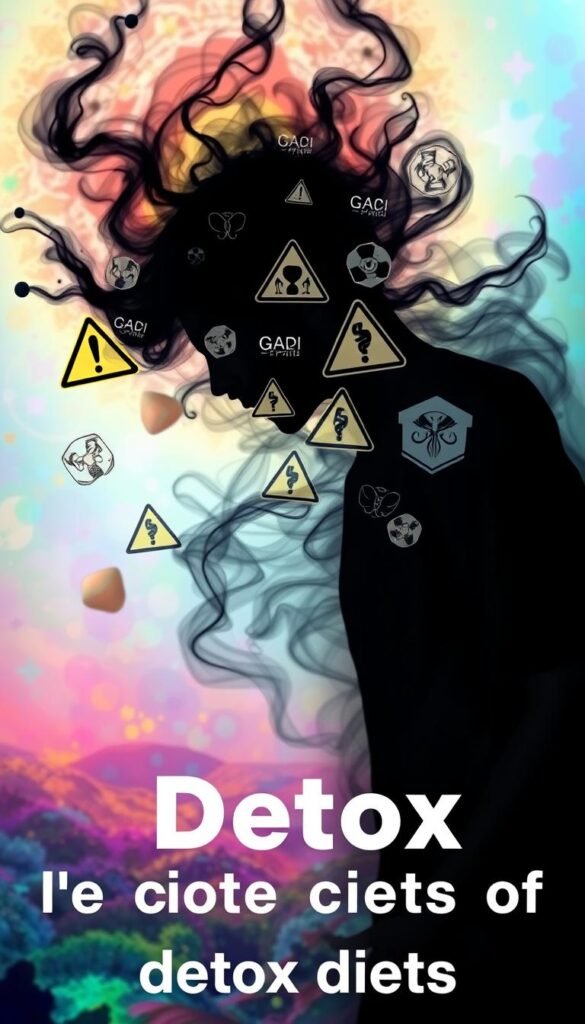Imagine giving your body a fresh start, like spring cleaning for your cells. A detox is more than just a trend; it’s a way to support your health and help your body function at its best. By focusing on nourishing foods, staying hydrated with water, and supporting organs like the liver, you can create a natural reset. Incorporating herbal solutions can amplify your detox journey, offering a range of herbal detox benefits for wellness. These natural remedies not only aid in cleansing but also enhance your overall vitality and energy levels. Embracing this holistic approach allows you to tap into the wisdom of nature while prioritizing your health and well-being.
This approach isn’t about extreme diets or quick fixes. Instead, it’s about aligning your lifestyle with your body’s innate ability to heal. When you eliminate toxins, you may notice a natural shift in your weight as your metabolism finds balance.
Think of it as a temporary reset, not a permanent solution. By integrating mindful habits, you can create lasting change. Let’s explore how this holistic approach can guide you toward a healthier, more vibrant you.
Key Takeaways
- Detox supports your body’s natural healing processes.
- Focus on nourishing foods and staying hydrated.
- It’s a temporary reset, not a long-term solution.
- Helps balance metabolism and improve overall health.
- Integrates ancient wisdom with modern nutritional science.
What is Detox and How Does It Work?
Your body is a finely tuned system, constantly working to keep you healthy. Detoxification is the process of supporting your body’s natural ability to filter out harmful substances. It’s not about replacing your body’s functions but enhancing them.
The liver plays a key role in this process. Think of it as a wise guardian, transforming harmful substances into harmless waste. Alongside the liver, your kidneys, skin, and digestive system work together to keep you balanced.
Modern life exposes us to more toxins than ever before. Pesticides, plastics, and processed foods can strain your detox pathways. This is where a dietary detox can help. By focusing on whole foods, staying hydrated, and reducing exposure to harmful substances, you give your body the tools it needs to thrive.
Detoxification happens in three phases: mobilization, transformation, and excretion. During mobilization, toxins are released from tissues. In transformation, the liver breaks them down. Finally, excretion removes them through urine, sweat, or stool.
Your body’s detox rhythms are tied to your sleep patterns. A good night’s rest supports your body’s ability to process toxins effectively. According to an NIH study, 90% of toxins are processed through hepatic pathways, highlighting the liver’s importance.
While short-term detox practices like fasting or juice cleanses can be helpful, ongoing lifestyle habits are key. Reducing your toxin load from environmental and metabolic sources ensures long-term health. By understanding and supporting your body’s natural processes, you can create a foundation for lasting well-being. Incorporating practices such as regular exercise and a balanced diet can further enhance your body’s ability to detoxify. Moreover, exploring the intermittent fasting benefits for detox can help reset your metabolism and promote cellular repair. By making these changes part of your daily routine, you can enhance your overall health and vitality over time.
The Connection Between Detox and Weight Loss

Your body’s ability to shed excess pounds might be influenced by more than just diet and exercise. Toxins stored in fat tissue, such as POPs and BPA, can slow your metabolic rate by 15-20%. This creates a biological resistance to fat burning, making it harder to lose weight.
Research shows that toxins trigger an inflammatory response, which can impact insulin sensitivity. A 2015 Korean study found that a 7-day lemon detox reduced body fat percentage and waist circumference. This highlights the potential of detox practices to support your goals.
Clinical evidence also links pesticide exposure to a 37% higher obesity risk. This underscores the importance of reducing toxin consumption in your daily life. However, not all weight changes during detox are permanent. Water retention accounts for 65% of initial weight loss, which is often temporary.
Severe calorie restriction can lower your metabolic rate long-term, counteracting your efforts. Stress from detox practices might also increase cortisol levels, further hindering progress. Instead of focusing solely on calorie math, consider the concept of nutritional density. Nutrient-rich foods can support your body’s natural processes more effectively.
| Factor | Impact on Weight Loss |
|---|---|
| Toxins in Fat Tissue | Slows metabolism by 15-20% |
| Pesticide Exposure | 37% higher obesity risk |
| Water Retention | 65% of initial weight loss |
| Calorie Restriction | May lower metabolic rate |
Understanding these factors can help you approach weight loss with a more holistic mindset. By supporting your body’s natural detox pathways, you create a foundation for lasting change.
Popular Detox Methods for Weight Loss

Exploring different ways to support your body’s natural processes can be transformative. From juice cleanses to intermittent fasting, each method offers unique benefits. Let’s dive into some of the most effective approaches to reset your system and promote balance.
Juice Cleanses
Juice cleanses are often referred to as “liquid meditation.” They provide a break for your digestive system while flooding your body with nutrients. For example, a green juice with cabbage offers just 125 calories per serving, making it a light yet nourishing option.
However, it’s important to note that juice cleanses can leave nutrient gaps. While they may provide clarity and energy, they might not sustain you long-term. A watermelon-ginger juice, with 130 calories per serving, is a refreshing alternative that combines hydration with flavor.
Intermittent Fasting
Intermittent fasting focuses on mindful eating windows rather than strict calorie counting. The 16:8 method, where you fast for 16 hours and eat within an 8-hour window, is the most common. Another variation, the 5:2 diet, involves eating normally for five days and reducing calories for two.
This approach encourages your body to tap into stored energy, supporting fat loss. Unlike restrictive diets, intermittent fasting emphasizes balance and sustainability.
Whole Food Detox Diets
Whole food detox diets bridge ancestral eating with modern nutrition. They focus on nutrient-dense ingredients like cruciferous vegetables, berries, and lean proteins. These foods work together to support your body’s natural detox pathways.
For example, kale’s vitamin C enhances iron absorption from lentils, showcasing the power of food synergy. This method nurtures your body like tending to a garden, fostering long-term health rather than quick fixes.
Be cautious of the detox industry, which is valued at $5.6 billion. Many products and supplements are unregulated, so focus on whole, natural ingredients for the best results. By choosing the right plan, you can create a foundation for lasting well-being.
Benefits of Detox for Weight Loss

Think of your body as a garden—when nourished with the right care, it flourishes. A well-planned reset can bring numerous benefits, from improved digestion to enhanced energy levels. Let’s explore how this approach can transform your health.
One of the most immediate effects is a metabolic reboot. Imagine restarting a computer to clear out unnecessary processes. Similarly, a 7-day reset can improve digestion for 78% of people, according to a 2023 survey. This process helps your body process foods more efficiently, leading to better nutrient absorption.
Your gut microbiome also benefits. Fiber-rich foods feed beneficial bacteria, creating a healthier digestive environment. This shift can reduce sugar cravings by 42%, as noted in the Journal of Nutritional Science. Over time, this helps break emotional eating patterns, fostering a sense of “food sobriety.”
Clinical improvements are another key advantage. Blood pressure drops by an average of 8mmHg within two weeks, promoting cardiovascular health. Additionally, 61% of participants report clearer skin, a sign of reduced inflammation and improved toxin elimination.
Stabilized blood sugar rhythms lead to sustained energy throughout the day. This contrasts with the highs and lows caused by processed foods. By focusing on whole, nutrient-dense options, you provide your body with “vitality calories” rather than empty ones.
Finally, this approach encourages nutritional mindfulness. It’s not just about what you eat but how you think about nutrition. This mindset often carries beyond the reset period, fostering long-term habits that support your overall well-being.
Potential Risks and Side Effects of Detox Diets

While detox practices can offer benefits, it’s essential to understand the potential risks. Not all methods are created equal, and some can lead to unintended consequences. By being informed, you can make choices that support your well-being without compromising your health.
Calorie Restriction and Nutrient Deficiencies
Extreme calorie restriction is a common pitfall in many detox plans. Research shows that 34% of people experience dizziness during water fasts, according to the American Dietetic Association. This happens because your body lacks the fuel it needs to function properly.
Long-term juice cleanses can also lead to nutrient deficiencies. For example, potassium levels may drop, causing muscle weakness and fatigue. A balanced intake of nutrients is crucial for maintaining energy and overall health.
Studies highlight the importance of moderation. Severe calorie cuts can lower your metabolic rate, making it harder to maintain results. Instead of extreme measures, focus on nourishing your body with whole, nutrient-dense foods.
Overuse of Supplements and Cleanses
The detox industry is filled with products that promise quick results. However, 72% of detox pills lack FDA approval, raising concerns about their safety. Overuse of these supplements can lead to serious health issues.
Detox teas, for instance, have caused a 12% spike in ER visits, as reported by the CDC in 2022. These products often contain laxatives or diuretics, which can disrupt your body’s natural balance. Instead of relying on artificial stimulants, support your body’s innate detox pathways.
Psychological risks are another concern. Perfectionists may develop orthorexia, an unhealthy obsession with “clean” eating. This mindset can lead to anxiety and disordered eating patterns. Always approach detox with self-compassion and balance.
Here’s a quick checklist to help you stay safe:
- Monitor your energy levels and hydration.
- Avoid extreme calorie restriction or fasting.
- Choose whole foods over unregulated supplements.
- Listen to your body and seek professional care if needed.
By understanding these risks, you can make informed decisions that prioritize your health and well-being.
How to Safely Incorporate Detox into Your Lifestyle
Embarking on a journey to reset your system can feel like tuning an instrument—gentle adjustments lead to harmony. Whether you’re exploring a short-term cleanse or long-term habits, safety and sustainability are key. Let’s dive into practical ways to support your body’s natural rhythms.
Start with a detox hierarchy, ranging from gentle to intensive methods. For example, a 3-7 day cleanse can be effective, but always listen to your body. Hydration is crucial—aim for 0.5-1 ounce of water per pound of body weight daily. This simple step supports your system and keeps energy levels steady.
Post-detox, follow a 3-day reintroduction protocol. Gradually add foods back into your diet, focusing on whole, nutrient-dense options. This helps your body adjust without overwhelming it.
Here are the five pillars of sustainable detox:
- Hydration: Water is the foundation of every detox plan.
- Fiber: Supports digestion and toxin elimination.
- Movement: Gentle exercise like yoga or walking aids circulation.
- Sleep: Rest allows your body to repair and reset.
- Stress Management: Practices like meditation keep cortisol levels in check.
Consider a sample daily schedule that blends intermittent fasting with nutrient-rich meals. For example, start your day with a glass of water and herbal tea, followed by a balanced lunch and dinner. Synergistic practices like dry brushing, infrared saunas, or lymphatic massages can enhance your efforts.
Adopt the “crowding out” strategy—add healthy foods before removing less nutritious ones. This approach makes transitions smoother and more sustainable. Align your detox efforts with the seasons; spring and fall are ideal times for a reset.
When choosing supplements, prioritize third-party testing and ingredient transparency. Your personalized detox blueprint should reflect your unique needs and goals. Remember, small, intentional changes lead to lasting health and vitality.
Conclusion
Your journey to better health is a continuous path, not a single destination. A detox is not an endpoint but a beginning—a chance to reset and realign with your body’s natural rhythms. It’s about creating a foundation for lasting well-being, not chasing quick fixes. Incorporating practices that support your body’s innate healing processes is essential for long-term vitality. This is where detox supplements for holistic health can play a pivotal role, helping to enhance your detoxification efforts while providing essential nutrients. By embracing this comprehensive approach, you empower yourself to foster a healthier, more balanced lifestyle.
Think of your body as a sacred temple, not a battleground. Nourish it with foods that support its innate wisdom. True nutrition goes beyond a temporary diet; it’s a lifestyle that honors your unique needs.
Healing happens in spirals, not straight lines. If you’re struggling, remember that progress is about care and consistency. Listen to your body’s signals and seek guidance from trusted sources like the NIH or registered dietitians.
What does true nourishment mean to you? Reflect on this as you craft your personal plan. Your story is yours to write—one step, one choice, one moment at a time. Embrace the journey with curiosity and compassion.
